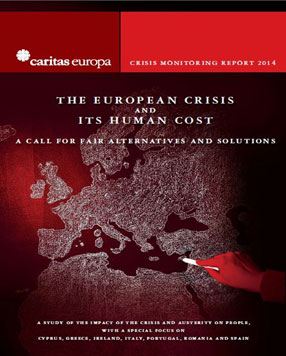Austerity is not working for Europe. 5 years on since the beginning of the crisis growth is still very low if existing at all, unemployment is still rising and the amounts of people in poverty is increasing.
Caritas Europa’s new report on the impact of crisis reveals disturbing levels of poverty and deprivation in the seven EU countries worst hit by the economic crisis; Cyprus, Greece, Ireland, Italy, Portugal, Romania and Spain.
The report “The European Crisis and its Human Cost – A Call for Fair Alternatives and Solutions” – is the second annual edition in a series of in-depth examination of the human impact that austerity policies are having on people in the EU. It also documents the growing number of people struggling with poverty and social exclusion.
The report depicts an unfair Europe, where social risks are increasing, social systems are being downsized and individuals and families are under stress. It shows a Europe where the social cohesion is fading out and where people’s trust on the political institutions is increasingly weakening. This creates a risk for Europe on a greater, long-term scale.
With the report, Caritas Europastrongly challenges the official discourse suggesting that the worst of the economic crisis is over.The crisis is not over. Current political choices are having extremely negative impact on vulnerable people, and are pushing many others into poverty for the first time.
MAIN CONCLUSIONS
The report’s conclusions are based on the unique grass-roots life testimonies that Caritas organisations are witnessing through their work with people experiencing poverty.
Its principal conclusion is that the policy of prioritising austerity is not working and that an alternative approach should be adopted, such as putting in place benchmarks which assess the social impact of proposed economic measures before implementing them.
Authorities do have choices. They can decide what policy approaches to use and who to target with them, basing their decision on fairness and justice.
The report clearly shows how poor people are – after over 5 years of economic crisis – still paying for a crisis they didn’t cause. Poor people are getting poorer.
“Politicians have choices when deciding which measures must be taken to alleviate the worst effects of the crisis; especially for the most vulnerable members of our societies,” says Jorge Nuño Mayer, Secretary General of Caritas Europa.” – Jorge Nuño Mayer, Secretary General of Caritas Europa
 |
What is the Crisis Monitoring Report?
The Crisis Monitoring Report is an in-depth analysis on how the crisis is addressed in the 7 EU countries worst hit by the crisis. Namely, Cyprus, Greece, Ireland, Italy, Romania and Spain. It looks into employment/unemployment rates, poverty/social exclusion levels, the state of public services in general and of health care in particular; and the state of trust on national and European Institutions and the social cohesion in these countries. This is done with the unique “Caritas formula”, which is the combination of official figures from Eurostat and national statistic offices with from-the-field information gathered at the hundreds of Caritas’ support centres distributed in the covered countries. This unique combination gives a very accurate temperature of the socio-economic situation of the population, from middle class down to the most vulnerable people.
“We believe that this report can contribute to more awareness of the impact of the crisis on the vulnerable groups. It confirms the calls for alternative policy solutions. The world documented in this report is not just. Moreover, the prioritisation of austerity measures has not solved the crisis but caused social problems that will have lasting impacts.”
Background
In early 2013 Caritas Europa published its first crisis monitoring report – The Impact of the European Crisis: A Study of the Impact of the Crisis and Austerity on People, with a special focus on Greece, Ireland, Italy, Portugal and Spain. The report was informed by studies and statistics from across Europe and by Caritas member and affiliated organisations in the five countries concerned, who work with poor and vulnerable people.
One conclusion was that the world documented in that report was not just. Another was that the prioritisation of austerity measures to the virtual exclusion of all other approaches would not solve the crisis and was causing social problems that would have lasting impacts. Many European stakeholders, including the European institutions, civil society organisations and international media, welcomed and acknowledged the report as it was one of the first voices to contest the official narrative on the real impact of the crisis and the necessity of austerity measures.
With these reports, Caritas Europa is bringing forward the voice of those directly and most heavily affected by the policies put in place to tackle the crisis. The European Crisis and Its Human Cost contributes to the current revision and monitoring of the way the Troika operates, while raising serious doubts on the real efficiency and necessity of austerity measures.
Originally published: http://www.caritas.eu/





